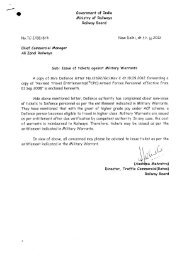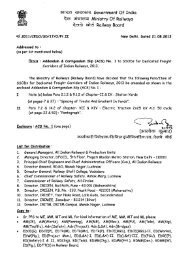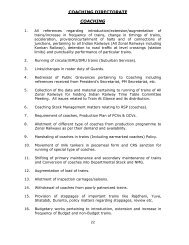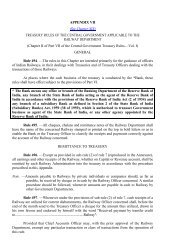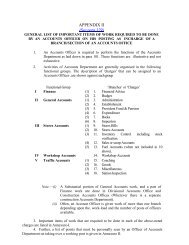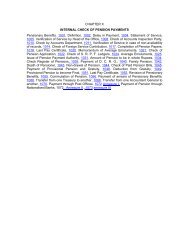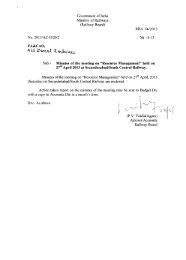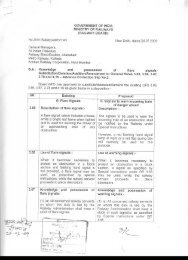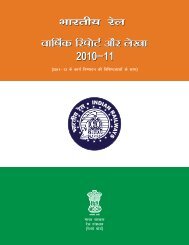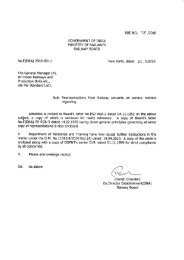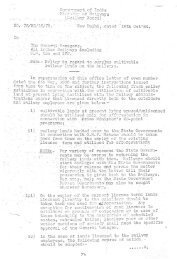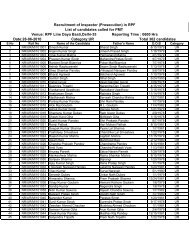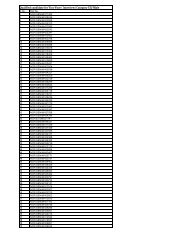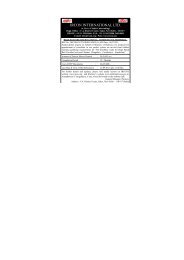Drunkenneess Policy - Indian Railway
Drunkenneess Policy - Indian Railway
Drunkenneess Policy - Indian Railway
Create successful ePaper yourself
Turn your PDF publications into a flip-book with our unique Google optimized e-Paper software.
GOVERNMENT OF INDIA<br />
MINISTRY OF RAILWAYS<br />
(RAILWAY BOARD)<br />
No.2001/Safety-I/23/4 New Delhi-110001<br />
27 th November, 2001.<br />
The General Manager(Safety)<br />
All <strong>Indian</strong> <strong>Railway</strong>s.<br />
Sub: Revised <strong>Policy</strong> on ‘Drunkenness on duty’.<br />
Board has approved the revised policy on drunkenness in order to make it more effective<br />
for controlling drunkenness amongst staff, particularly safety categories. Revised <strong>Policy</strong> is sent<br />
herewith as annexure. <strong>Railway</strong>s are directed to get these policy booklets printed and implement the<br />
revised policy on their system.<br />
Necessary changes in concerned manuals shall be made by Ministry of <strong>Railway</strong>s and will be<br />
advised in due course.<br />
Please acknowledge the receipt.<br />
CC to all Federations<br />
Safety(A&R) Branch for processing the modification in the concerned G.R.<br />
DG/RDSO for early standardization of State- of-Art Breathalyzers.<br />
DG/Health for processing necessary changes in Medical manual.<br />
AM Commercial for making necessary amendments in <strong>Railway</strong><br />
AM Staff<br />
Drinking 03 July 2006 18:08 Page No 1<br />
Sd/-<br />
(Indra Ghosh)<br />
Executive Director(safety)<br />
<strong>Railway</strong> Board.
DRUNKENNESS ON DUTY – A SAFETY HAZARD<br />
1. Aim of the Revised <strong>Policy</strong>:<br />
(Revised Alcohol <strong>Policy</strong> for <strong>Indian</strong> <strong>Railway</strong>s)<br />
(i) Ensuring that staffs who are having a drinking problem are identified.<br />
(ii) Protect the health and welfare of staff by offering counselling and rehabilitation to<br />
those with alcohol related problems.<br />
(iii) Prevent risks to staff, passengers and the general public from abuses of alcohol by<br />
staff in Safety critical posts.<br />
(iv) Prevent the damaging effects of alcohol on optimum operational efficiency.<br />
(v) Take up with staff who are incorrigible and are a danger both to themselves as also<br />
to the system.<br />
2. General Aspects of Revised Alcohol <strong>Policy</strong>:<br />
(i) A booklet should be got printed by all Zonal <strong>Railway</strong>s briefly explaining the revised<br />
alcohol policy of <strong>Indian</strong> <strong>Railway</strong>s, its aims and objectives, along with its benefits<br />
both for the staff as also for the organisation as a whole.<br />
(ii) It should be made applicable to all categories of Staff. However, for the present, for<br />
overcoming logistic problems, it is proposed to introduce it only for those categories<br />
of staff connected with train running.<br />
(iii) The train running staff who would be covered under the Revised Alcohol <strong>Policy</strong> in<br />
Phase-I are as follows:<br />
(a) Drivers/Motormen/Asst. Driver/Guards.<br />
(b) ASMs/SMs.<br />
(c) Pointsmen / Leverman/ Cabinmen/ Switchmen.<br />
(iv) However in first phase it is to be introduced for the running staff as they are directly<br />
involved in train running and their mistake may cause a serious accident which is<br />
detrimental to safe running of passengers.<br />
(v) The running staff viz driver, Asstt Driver shall undergo breathalyser test both at the<br />
time of signing-on and Signing off as per <strong>Railway</strong> Board instructions.<br />
(vi) The Station /yard staff and other categories of staff will be subjected to Sample test<br />
/ Surprise test by supervisors and officers carrying portable breathalysers.<br />
(vii) Officers should keep a list of all Senior Supervisors working under them who are<br />
habitual of drinking.<br />
(viii) Similarly, Senior Supervisors should keep a list of all staff working under them that is<br />
habitual of drinking.<br />
(ix) All such staff who is short-listed would now form the target population. They must<br />
be divided into two categories as Chronic or Habitual depending on the severity of<br />
their drinking habits.<br />
(x) The idea is that each level ‘N’ must keep a watch on level ‘N–1’ immediately<br />
below. For example, LI should keep a watch on all short listed drivers attached with<br />
him; Crew Controller should keep a watch on all such Asstt. Drivers, and similarly<br />
Station Master should keep a watch on the staff posted at his station.<br />
Drinking 03 July 2006 18:08 Page No 2
(xi) For <strong>Indian</strong> conditions, the following Safety limits are laid down for the presence of<br />
alcohol in blood and urine:<br />
(a) Between 01- 20 mg/100 ml, the person concerned will not be allowed to<br />
perform duty.<br />
(b) Between 21 - 40 mg/100 ml of blood is dangerous.<br />
(c) Between 41 - 70 mg/100 ml of blood is very dangerous.<br />
(d) Beyond 70 mg/100 ml of blood requires immediate action.<br />
3. Reformative Aspects of Revised Alcohol <strong>Policy</strong>:<br />
(i) The following reformative action is to be taken for the staff short-listed as either<br />
chronic or habitual.<br />
(ii) Counselling of staff during initial/promotional training courses and periodical medical<br />
examination. Employees should be told about hazards of drinking as also about the<br />
short and long-term effects of drinking.<br />
(iii) They should be counselled for:<br />
(a) Not drinking alcohol eight hours before going on duty.<br />
(b) Should not have smell of alcohol on their breath while on duty.<br />
(c) Should not drink alcohol while on duty.<br />
(iv) The railways may either decide to organise de-addiction camps within their own<br />
resources on the same pattern as Southern <strong>Railway</strong>.<br />
(v) Alternatively, NGOs should be identified at Zonal Head quarters and preferably at<br />
each divisional Head quarters also for organising rehabilitation programmes for deaddiction.<br />
(vi) Organising of these camps at regular intervals must be a continuous process and<br />
should not be given up after a one-time exercise. The modalities for organising such<br />
de-addiction camps may be worked out with each NGO on a long-term basis.<br />
(vii) It can be decided as a policy that in case some expenditure is incurred by the<br />
railway by way of payment to NGOs, then 50% of the same may borne by the<br />
railway and 50% by the staff concerned.<br />
(viii) The staff that has been categorised as habitual should be sent first, on priority, for<br />
undergoing rehabilitation programme for de-addiction at the nominated centre in<br />
preference to staff who have been categorised as cronic.<br />
(ix) Staff who go for the de-addiction camp and successfully complete it will be kept<br />
under watch for a further period of 6 months and thereafter taken off the list.<br />
(x) Staff who undergo the rehabilitation programme but are unsuccessful in their first<br />
attempt will be given a second chance for undergoing the de-addiction camp.<br />
(xi) Staff who is unsuccessful a second time will be medically decategorised and taken<br />
off Safety critical posts.<br />
(xii) Staff who refuse to go will be dealt with as follows:<br />
(a) No further promotion.<br />
(b) Special check to be kept on their working with particular reference to<br />
frequent and surprise breathalyser tests and blood/urine samples.<br />
(c) Any lapses on their part will be dealt with as laid down under item no. 5.<br />
Drinking 03 July 2006 18:08 Page No 3
4. Preventive Aspects of Revised Alcohol <strong>Policy</strong>:<br />
(i) While recruiting staff for safety critical posts of Asstt. Driver or Lever man or ASM,<br />
each candidate must be screened for alcohol content in their blood. Alcohol level of<br />
any amount will render the candidate unsuitable for recruitment.<br />
(ii) Each staff should be held responsible for ensuring that they do not hand over/take<br />
charge from another staff who is under the influence of Alcohol. Failure to do so will<br />
make them liable for disciplinary action.<br />
(iii) Each staff should be held responsible for ensuring that they report all cases of any of<br />
their co-workers who is under the influence of Alcohol on duty. Failure to do so will<br />
make them liable for disciplinary action.<br />
(iv) All Driver’s and Guard’s Lobbies must be provided with heavy-duty breathalysers,<br />
which are capable of indicating the blood alcohol level from breathalyser test alone.<br />
A stand by breathalyser may also be made available.<br />
(v) All Running/Operating Officers/Inspectors must be provided with portable<br />
breathalysers for conducting surprise checks especially with regard to those staff<br />
who have been categorised as either chronic or habitual.<br />
(vi) No Running staff will be allowed to sign on for duty without undergoing the<br />
breathalyser test. The readings of the breathalyser test must be entered in the signing<br />
on register.<br />
(vii) In case the result of the breathalyser test is positive then a printout of the readings<br />
must be obtained for further action.<br />
(viii) In case the staff concerned refuses to co-operate in undergoing the breathalyser test,<br />
he should be taken up under D&AR.<br />
5. Deterrent Aspects of Revised Alcohol <strong>Policy</strong>:<br />
(i) Immediate supervisors of staff should be used as auditing agency for purposes of<br />
conducting surprise checks etc.<br />
(ii) Post Accident medical examination of all the involved staff should invariably be<br />
resorted to immediately. This should be irrespective of whether the staff concerned<br />
is prima facie responsible for the accident or not.<br />
(iii) Post Accident medical examination will give employees involved the opportunity of<br />
proving that alcohol played no part in causing the accident.<br />
(iv) The employee should be removed from safety critical post while waiting for the<br />
results of the Post Accident medical examination.<br />
(v) In case results of the alcohol test are positive then the staff concerned should be<br />
taken up under D&AR.<br />
(vi) Random surprise checks should be carried out on the staff. If they refuse for test the<br />
following action must be taken:<br />
(a) Will not be considered for promotion.<br />
(b) To be taken up under D&AR proceedings.<br />
(vii) If a Supervisor/Officer has a reasonable cause to suspect the fitness on duty.<br />
(a) Relieve from duty, until tested.<br />
(b) Remove from safety critical duties while waiting for results.<br />
(viii) If the result of the random medical check turns out to be positive, then the staff<br />
concerned should be taken up under D&AR.<br />
Drinking 03 July 2006 18:08 Page No 4
6. Punishment Norms:<br />
(i) Staff who is found with alcohol level of between 01 – 20 mg/100 ml of blood will<br />
not be permitted to perform duty.<br />
(ii) Staff who is found with alcohol level of between 21 – 40 mg/100 ml of blood will be<br />
issued a minor penalty in each case.<br />
(iii) Staff who is found with alcohol level of between 41 – 70 mg/100 ml of blood will be<br />
issued a major penalty in each case.<br />
(iv) Staff who is found with alcohol level of beyond 70-mg/100 ml of blood will be<br />
placed under suspension and disciplinary proceedings initiated against him for<br />
reversion from the safety critical post.<br />
(v) For repeated detection of 3 times, irrespective of the level of alcohol detected,<br />
disciplinary proceedings will be initiated against the staff concerned for reversion<br />
from the safety critical post.<br />
State of Art Breathalyser equipment capable of giving exact level of Alcohol content<br />
in the blood including print outs need to be introduced. These breathalysers should<br />
necessarily have the memory function so as in case of suspect a print out can be taken<br />
at a convenient location. Traffic Directorate of RDSO will standardise specifications<br />
of Fuel cell sensor based breathalysers.<br />
7. Changes required in Manuals and Rule Books:<br />
The revised alcohol policy for the <strong>Indian</strong> <strong>Railway</strong> will necessitate the following:<br />
(i) Amendment in the <strong>Indian</strong> <strong>Railway</strong> Act.<br />
(ii) Amendment in the Medical Manual.<br />
(iii) Inclusion of a Chapter in the General and Subsidiary Rules.<br />
(iv) The above amendments can only be carried out after holding discussions with<br />
organised labour unions.<br />
The Directorate concerned of <strong>Railway</strong> Board will amend the rules as per the above policy.<br />
Drinking 03 July 2006 18:08 Page No 5
Existing provisions in various Manuals and Rule Books<br />
1.1 Provision in <strong>Indian</strong> <strong>Railway</strong> Act 1989<br />
Article 172: Penalty for Intoxication: If any <strong>Railway</strong> servant is in a state of<br />
intoxication while on duty, he shall be punishable with fine which may<br />
extend to five hundred rupees and when the performance of duty in<br />
such state is likely to endanger the safety of any person travelling on or<br />
being upon a railway, such railway servant shall be punishable with<br />
imprisonment for a term which may be extended to one year, or with<br />
fine or with both.<br />
1.2 Provision in General and Subsidiary Rules:<br />
GR 2.09 Taking Alcoholic drink, sedative, narcotic, stimulant drug or<br />
preparation.<br />
(i) While on duty no railway servant shall, whether he is directly<br />
connected with the working of trains or not, be in a state of<br />
intoxication or in a state in which by reason of his having taken<br />
or used alcoholic drink, sedative, narcotic or stimulant drug or<br />
preparation his capacity to perform his duties is impaired.<br />
(ii) No railway servant directly connected with the working of trains,<br />
shall take or use any alcoholic drink, sedative, narcotic or<br />
stimulant drug or preparation within eight hours before the<br />
commencement of his duty or take or use any such drink, drug<br />
or preparation when on duty.<br />
SR 2.09/1 <strong>Railway</strong> servant found intoxicated<br />
(i) <strong>Railway</strong> servant found in a state of intoxication on <strong>Railway</strong> premises<br />
whether on or off duty, will be liable to summary dismissal.<br />
(ii) When any railway servant is found intoxicated on the railway premises<br />
or suspected to be in a state of intoxication, the evidence of two<br />
independent witnesses and if possible, a medical report regarding his<br />
condition should be obtained. Arrangements for his relief should be<br />
immediately made and matter reported to the proper authority.<br />
2.0 <strong>Indian</strong> <strong>Railway</strong> Medical Manual:<br />
(i) As per <strong>Indian</strong> <strong>Railway</strong> Medical Manual (Article 564), a person is drunk<br />
when he is so much under the influence of an intoxicating drink or<br />
drug as to lose control of his faculties to such an extent as to render<br />
him unable to execute safety the occupation at which he is engaged at<br />
the material time (Ministry of <strong>Railway</strong>s letter No.69/H/3/26, dated 03-<br />
01-70).<br />
(ii) Article 565 describes the mode of checking drunkenness – Annexure<br />
‘A’. Para 5 describes that a <strong>Railway</strong> doctor when certifying case of<br />
drunkenness, should base his opinion on following consideration<br />
(a) Whether the person concerned has recently consumed alcohol.<br />
(b) Whether the person concerned is so much under the influence of<br />
alcohol as to have lost control of his faculties to such an extent<br />
Drinking 03 July 2006 18:08 Page No 6
as to render him unable to execute safely the occupation on<br />
which he was engaged at the material time.<br />
(c) Whether his state is due, wholly or partially, to a pathological<br />
condition which causes symptoms similar to those of an<br />
alcoholic intoxication, irrespective of the amount of alcohol<br />
consumed.<br />
(iii) He should not certify the case as drunk just because patient smells of<br />
alcohol. The quantity taken also is no guide, but the fact of impairment<br />
of his capacity to perform his duties has to be taken into account.<br />
(iv) The program for recording particulars of suspected cases of<br />
drunkenness is annexed herewith.<br />
Drinking 03 July 2006 18:08 Page No 7
Annexure - I<br />
564.All drunkenness cases be examined carefully:-<br />
(1) Every case of drunkenness is a potential medico-legal case and the <strong>Railway</strong> doctor called<br />
upon to certify such a case should make a careful examination and should note down every<br />
important particular.<br />
(2) <strong>Railway</strong> doctors may also have to issue drunkenness certificates to persons produced by<br />
police at places where there are no civil hospitals or dispensaries and only a <strong>Railway</strong><br />
hospital or health unit exists.<br />
(3) In places where prohibition is in force, it is an offence even if one has imbibed alcohol, let<br />
alone getting drunk. When a case is brought, the <strong>Railway</strong> doctor should carefully examine<br />
the case and certify as to whether:<br />
(a) The person has imbibed alcohol but not drunk or that<br />
(b) The person is actually drunk i.e. under the influence of alcohol.<br />
(1) The Performa for recording particulars of a suspected case of drunkenness is given in<br />
Annexure-XIX to this chapter. This form should always be kept handy as the <strong>Railway</strong><br />
doctor may be called upon to certify drunkenness at any moment and sometimes away from<br />
his headquarters.<br />
(2) It is desirable that a <strong>Railway</strong> doctor, when certifying cases of drunkenness, should base his<br />
opinion on the following consideration: -<br />
(i) Whether the person concerned has recently consumed alcohol.<br />
(ii) Whether the person concerned is so much under the influence of alcohol as to have<br />
lost control of his faculties to such an extent as to render him unable to execute<br />
safely the occupation on which he was engaged at the material time.<br />
(iii) Whether his state is due, wholly or partially, to a pathological condition, which<br />
causes symptoms similar to those of alcoholic intoxication, irrespective of the<br />
amount of alcohol consumed.<br />
(1) He should not certify the case a drunk just because the patient smells of alcohol. The<br />
quantity taken is also no guide, but the fact of impairment of his capacity to perform his<br />
duties has to be taken into account.<br />
565. Instructions regarding issue of certificates for drunkenness<br />
(1) When a <strong>Railway</strong> doctor is called upon to certify a case of drunkenness in a <strong>Railway</strong><br />
employee, he should after careful examination immediately report by a telegram or urgent<br />
letter his opinion to the immediate superior or Divisional Officer of the employee concerned<br />
intimating whether the employees should be put off duty or not.<br />
(2) When a <strong>Railway</strong> doctor is asked to certify the crew of a running locomotive and if on<br />
examination he finds a member of the same under the influence of alcohol, he should<br />
immediately issue a memo to the authority concerned, putting the person off duty.<br />
(3) As far as possible, the Senior Assistant Divisional Medical Officer themselves should<br />
Drinking 03 July 2006 18:08 Page No 8
undertake to examine such cases of drunkenness rather than depot their juniors, and in case<br />
of doubt, should refer the case to the Divisional Medical Officer or Assistant Divisional<br />
Medical Officer in charge of his section.<br />
Drinking 03 July 2006 18:08 Page No 9



